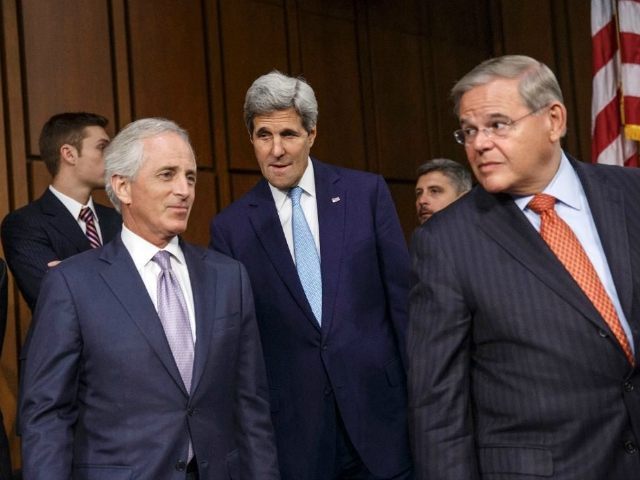Secretary of State John Kerry appeared before the Senate on Thursday to defend his administration’s nuclear deal with Iran. As expected, he took a great deal of heat from irate Republicans, plus a few skeptical Democrats, notably Sen. Bob Menendez of New Jersey. The headline-grabbing moment came when Sen. Bob Corker (R-TN) said John Kerry had been “fleeced” by the Iranians.
But the same Sen. Corker earlier worked out a political deal with President Obama that reversed the normal voting procedure for getting the Iran deal through the Senate, making it all but impossible for the Republican majority to do anything but complain about it.
There is an uncomfortable parallel between the foregone conclusion of Republicans’s struggle against the Iran deal, and the administration’s negotiations with Iran. In both cases, the outcome was a foregone conclusion, and all else is theatrical.
Having arranged matters so that they are unable to do anything to influence the outcome of this catastrophe, the GOP leadership will now proceed to loudly complain about it, and even raise funds from donors off their ineffective opposition. It is what blogger Ace of Spades memorably calls “Failure Theater.” “So now we’re in the ‘I just can’t believe the outrageous things I already voted for’ phase of the Failure Theater performance,” he grumbled after watching Thursday’s performance.
Sen. Corker’s actual “fleece” quote involved comparing Kerry to “a hotel guest that leaves with only a hotel bathrobe on his back.” That is a metaphor about people stealing bathrobes, or wandering out of their hotel rooms in a daze, not gullible rubes being shaken down by smooth operators.
Sen. Jim Risch (R-ID) was more on point by telling Kerry, Energy Secretary Ernest Moniz, and Treasury Secretary Jacob Lew, “With all due respect, you guys have been bamboozled, and the American people are going to have to pay for it.”
Kerry’s response to the fleecing charge, according to Politico, involved praising “the negotiating skills of his counterparts in China and Russia” and arguing “they’re ‘not dumb’ and wouldn’t have signed off on this agreement unless it was a good one.”
The Secretary of State just argued that it must be a good deal for America, because Russia and China like it.
The details of the real arrangement currently being implemented through the United Nations—completely freezing the American people and their representatives out of the process—bear little resemblance to the administration’s rhetoric. Iran is being honest with its legislature about the details, while the administration just keeps spinning—and acting surprised every time the mullahs push them off the “Failure Theater” stage, into the orchestra pit.
We have already been treated to Kerry’s slapstick performance of claiming to be “disturbed” when the Iranians refused to stop chanting “Death to America!” and vowing to defeat us in a global war. Now the administration is acting surprised that the ban on Iranian ballistic missile technology evaporated in eight hours, instead of the eight years they repeatedly claimed.
For years, President Obama and Secretary Kerry repeated the mantra that they would never value a bad deal over no deal at all. But now, Kerry is explicitly telling the Senate that his bad deal is better than no deal at all because the one and only alternative is a war with Iran, which they think the United States would lose.
Sen. Marco Rubio (R-FL) asked Kerry and Energy Secretary Ernest Moniz if the obligation for the U.S. to help Iran protect its nuclear facilities from sabotage—yes, we actually agreed to help Iran protect its nuclear program—would oblige us to defend Iran against Israel, or other U.S. allies. Moniz offered some boilerplate about how all options remain on the table for stopping an illegal Iranian bomb project. And Kerry added, “To be able to have longer-term guarantees as we enter a world in which cyberwarfare is increasingly a concern for everybody that if you are going to have a nuclear capacity, you clearly want to be able to make sure that those are adequately protected.”
As Business Insider notes, Kerry volunteered that we would even be helping Iran block cyber espionage, such as the Stuxnet virus America helped Israel deploy against Iranian nukes in 2010 (an action never officially acknowledged). Israel excels at such electronic espionage. Part of this lousy Iran deal involves checkmating every effort short of an ostensibly unthinkable full-blown shooting war to thwart their nuclear ambitions. The end of the story is written, and has been spoiled; all that remains is to fill in a few chapters of geopolitical drama.

COMMENTS
Please let us know if you're having issues with commenting.